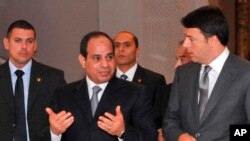Egyptian President Abdel Fattah al-Sissi has told journalists that the Egyptian peace proposal to end the conflict in Gaza was "still on the table" and that Egypt would like see a rapid conclusion to the violence.
Egypt extended its diplomatic efforts Saturday, despite the ongoing violence in Gaza. An Israeli delegation, which had been expected in Cairo, cancelled its visit, amid the fighting. The arrival of a joint Palestinian delegation, announced last week, has also yet to materialize.
At a joint news conference in Cairo, visiting Italian Prime Minister Matteo Renzi and Egyptian President Abdel Fattah al-Sissi voiced support for a quick conclusion to the hostilities between Israel and the Hamas militant group.
Sissi insisted that there is “no alternative” to the Egyptian peace proposal and that its acceptance at the start of the conflict would have “avoided much bloodshed and loss of life”:
The Egyptian leader said that Egypt's peace plan is "still on the table and capable of solving the conflict" and that efforts have been exerted from the outset with all the parties. He stressed that the proposal was made before Israel began its ground operation and before the loss of many lives.
President Sissi also discussed the deteriorating security situation in neighboring Libya and called on the international community to act to help restore order.
Libya violence increases
He said that as violence intensifies, the international community and Europe, especially, have "moral, humanitarian and security responsibilities" to act. He added that there should be an international strategy to confront the spread of terrorism in the region.
Sissi went on to argue that Egypt's security situation has improved markedly since last year, but that the country remained “at war” as terrorist attacks continue, albeit at a lower level. Mr. Sissi noted that Egypt is facing a growing threat from its border with Libya, due to the “absence of security forces on the Libyan side.”
Well-known military analyst and retired General Sameh Seif el-Yazal tells VOA that "1000 militias and military groups are active in Libya" making it extremely difficult to stabilize and that many of them are funded and have ties to "outside countries and their intelligence services." Egypt's 1049 kilometer border with Libya, he points out, is "controlled by three main groups, two of which are close to the Muslim Brotherhood and one of which has ties to al Qaida."
Seif el-Yazal adds that the Ansar al-Sharia group, which is trying to control Benghazi, is "extremely fanatic... and believes in aggression and killing people." He worries that the group may "in the coming weeks or months form the core of a Libyan version of ISIL," the extremist Islamic group active in Iraq and Syria. Al-Arabiya TV reported that Ansar al-Sharia proclaimed an Islamic Emirate in Benghazi several days ago.
Ansar al-Sharia militants captured a Libyan Army base inside Benghazi earlier this week, forcing troops loyal to retired Army Chief of Staff Khalifa Hafter to retreat. It is not yet clear how badly Hafter's forces have been defeated, but a government security compound was also attacked and set ablaze several times, before much of the structure collapsed.
Meanwhile, Libya's newly elected parliament met for discussions in the eastern city of Tobruk Saturday, postponing its formal inaugural session until Monday. The body's interim speaker, Abu Bakr al-Baiera urged Libyans to “unite” to confront the terrorist threat facing the country:
He said that parliament should unite the nation and put an end to what divides Libyans. He goes on to say that the difficult security situation had prevented some MPs from attending Saturday's session, prompting deliberations to be postponed until Monday.
In other developments, Libyan TV reported that rival militias resumed fighting in the capital, Tripoli, near a fuel depot, which had burned out of control for several days before firefighters finally were able to put it out. The TV report indicated that a mortar round had set part of the depot on fire yet again.




